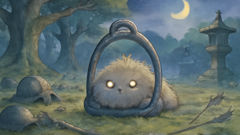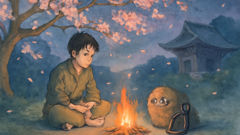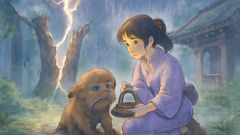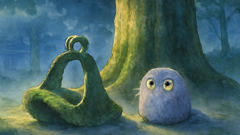Introduction
Mist drifted in gentle swirls across the forest floor, weaving around ancient cedars whose roots clung to mossy stones. In this quiet stretch of northern Honshu, the air was thick with the memories of old battles, the ground nourished by centuries of fallen warriors and silent prayers. Here, legend whispered of creatures born not from flesh, but from longing and loss—the Abumi-guchi, a small, furry yokai said to arise from the stirrup of a fallen samurai. Villagers rarely wandered into these woods after sunset, for even the bravest knew that sorrow sometimes found form in the twilight. Yet, within this haunted hush, time moved differently. Leaves rustled with secrets, shadows slipped between trunks, and somewhere beneath a tangle of roots, a patient spirit waited. The Abumi-guchi’s story wasn’t just one of magic; it was about loyalty so strong it outlasted lifetimes, about waiting when all hope seemed lost, and about how love and grief could shape the world in ways unseen. From the ashes of war and the silence of absence, the legend took root—soft as fur, sharp as memory, unyielding as the promise of return.
The Fallen Warrior and the Birth of the Abumi-guchi
The battle had raged for three days beneath the eaves of the Osanagi Forest. The clamor of steel on steel echoed among the trees, arrows hissed through the air, and the cries of men and horses mingled with the desperate shouts of commanders. It was the autumn of 1467, and civil war tore the northern provinces apart. Amidst this chaos rode Takehiro, a samurai of the Ishida clan, whose loyalty to his lord was matched only by his quiet kindness. Takehiro’s warhorse was swift and steady, his armor lacquered black, with a pair of ornate stirrups—abumi—shaped like crescent moons at his feet.

On the final evening, as the sun bled into the horizon, Takehiro fell. An arrow slipped past his helmet, and he toppled from his horse. In the confusion, his comrades were forced to retreat, leaving behind only blood, broken blades, and the trappings of war. The battlefield grew silent as darkness crept in, save for the faint sighing of the wind. The next morning, villagers came to gather the fallen. They found Takehiro’s body, but in their haste, one of his stirrups was left behind, tangled in bracken and mud.
As weeks passed and autumn deepened, the forest claimed the remnants of war. Moss crept over discarded armor, rain washed away the blood, and wildflowers bloomed where men once fell. Yet, something lingered beneath an ancient cedar—the stirrup that had cradled Takehiro’s foot for countless rides. Alone and forgotten, it absorbed the grief of the warrior’s untimely death and the longing for a master who would never return.
One moonless night, as mist pooled in hollows and the cries of owls echoed overhead, a quiet magic stirred. The stirrup quivered, shuddered, and then softened. Wisps of fur sprouted along its cold metal rim, curling into a downy coat. Two luminous eyes blinked open, reflecting starlight and sorrow. A nose twitched; tiny paws kneaded the moss. Thus, the Abumi-guchi was born—a creature shaped by waiting, its spirit woven from longing. It remembered the weight of Takehiro’s foot and the rhythm of the warrior’s journeys. And so, with every dawn and dusk, the Abumi-guchi curled by its stirrup, its patient vigil beginning.
Seasons slipped by unnoticed. The Abumi-guchi barely moved, save to stretch beneath a patch of sunlight or shift closer to its stirrup as snow began to fall. It watched the world change: foxes darting through ferns, crows gathering in bare branches, children’s laughter drifting faintly from distant villages. But its gaze never strayed from the path it hoped Takehiro would travel home. Each wind-borne leaf, each creaking step of a wandering deer, made its small heart leap with hope—only to be met with disappointment. Still, it waited, for waiting was all it knew. It didn’t understand death, only absence.
Decades passed. Villagers sometimes glimpsed a shadow moving among the roots, a flash of fur in the twilight. Old women muttered of yokai, warning children to stay clear of the ancient cedar. Some whispered that the spirit was harmless, merely lonely. Others believed it would curse any who touched the old stirrup. Yet none dared approach. In solitude, the Abumi-guchi’s hope never dimmed, though it grew softer, tinged with melancholy. Through storms and blossoms, in hunger and in plenty, it clung to its vigil. Loyalty, after all, outlasts even the memory of its purpose.
The Wandering Monk and the Stirrup’s Secret
Many years later, after the wars faded into legend and new generations tilled the fields, a wandering monk named Eita passed through the Osanagi forest. Eita was known for his humility and kindness; his sandals were worn thin, and his patched robe fluttered with every step. He’d heard tales of the haunted woods but believed compassion outweighed superstition. As dusk settled one spring day, Eita paused to rest beneath the same ancient cedar that guarded the Abumi-guchi.

He prepared a simple meal of rice and dried chestnuts, murmuring prayers for travelers lost in these woods. The air held a hush, broken only by distant warblers. As Eita closed his eyes, he sensed a presence—a soft shuffle in the undergrowth, a glimmer of eyes reflecting firelight. He did not startle, nor did he call out. Instead, he set an extra portion of rice on a leaf and placed it near the roots. The Abumi-guchi, watching from the shadows, crept forward cautiously. Hunger warred with fear, but the monk’s gentle aura soothed it. For the first time in decades, the Abumi-guchi tasted warmth—a meal offered not by its master, but by a stranger who saw its loneliness.
Night after night, Eita returned, sharing food and stories with the unseen spirit. He spoke of impermanence, of the pain of letting go, of the hope that guides even the most solitary souls. Gradually, the Abumi-guchi emerged from hiding. Eita glimpsed its round, furry body and mournful eyes. He recognized the yokai from old temple scrolls and felt no fear—only sympathy for its endless waiting. “You hold on so tightly to the past,” he whispered. “But sometimes, to find peace, we must let go.”
Eita began to clean the old stirrup, scrubbing away layers of moss and lichen while chanting sutras for Takehiro’s spirit. As he worked, the Abumi-guchi watched, torn between gratitude and anxiety. It feared losing its last tether to its master. But Eita’s prayers brought a gentle hush to the woods, as if even the crows stilled to listen. One evening, as cherry petals drifted through the air, Eita placed his hand on the Abumi-guchi’s head. “You have waited longer than any soul should,” he said softly. “If your master has found peace, perhaps you can too.”
The Abumi-guchi trembled, unsure. Its heart ached for Takehiro’s return, but Eita’s words lingered like birdsong after rain. That night, for the first time since its awakening, the Abumi-guchi dreamed—not of waiting, but of running through sun-dappled fields beside its master, free and joyful. When it awoke, the longing was still there, but now mingled with hope that it could find purpose beyond waiting.
Word of Eita’s kindness spread to nearby villages. Some began leaving offerings at the ancient cedar: rice cakes, sprigs of wildflowers, even the occasional scrap of silk. The Abumi-guchi was no longer entirely alone. It grew bolder, peeking out at children who dared approach, its eyes less sorrowful and more curious. The forest, once heavy with grief, now hummed with gentle anticipation—a sense that, while some spirits wait forever, others find peace through compassion and change.
A Child’s Courage and the Unbinding of Grief
One summer many years later, a young orphan named Hana wandered into the Osanagi woods. She was small for her age, with tangled hair and eyes that held storms and sunlight. Life in her village had grown too harsh; she fled hunger and cruelty, drawn by stories of gentle spirits whispered by elders at dusk. Hana followed fox trails and riversong until she reached the ancient cedar. There, exhausted and afraid, she curled beside a mossy root and wept.

Night fell quickly. As Hana shivered in her sleep, the Abumi-guchi approached. It remembered kindness—the food from Eita, the laughter of children who left sweets—and sensed Hana’s loneliness echoing its own. Softly, it curled beside her, sharing its warmth. When dawn broke, Hana blinked awake to find a small, furry creature nestled by her side. She gasped but didn’t scream. Instead, she reached out with trembling fingers and stroked its head. The Abumi-guchi nuzzled her hand in gratitude.
The days that followed were woven from small acts of trust. The Abumi-guchi led Hana to hidden springs and groves rich with berries. Hana learned to watch and listen—to birdsong, to wind, to the subtle signs left by animal friends. She spoke aloud her fears and dreams; the Abumi-guchi listened with quiet understanding. In return, Hana taught it games: how to toss acorns, how to chase shadows, how to laugh even when sadness lingered.
One stormy night, lightning struck the old cedar. Its trunk split, sending the ancient stirrup tumbling into the mud. The Abumi-guchi cried out in alarm, rushing to cradle the battered relic. Hana, seeing its distress, gathered the pieces and held them tight. She remembered Eita’s stories—of letting go, of finding new paths. “You don’t have to wait alone,” she whispered. “You can come with me.”
At first, the Abumi-guchi hesitated. For so long, its identity had been bound to the stirrup and the hope of Takehiro’s return. But Hana’s courage and kindness filled a space once hollowed by grief. The Abumi-guchi realized that waiting didn’t mean being forgotten; sometimes, love could take new forms.
As summer waned, Hana decided to leave the forest. She carried the old stirrup as a keepsake and the Abumi-guchi as her companion. Together, they traveled from village to village. Wherever they went, Hana shared her story: how grief could become friendship, how loyalty could heal, how even the loneliest spirit could find a new purpose. The legend of the Abumi-guchi spread across the province—not as a warning, but as a promise that no one waits alone forever.
Conclusion
Years passed, and Hana grew into a wise storyteller, her travels marked by acts of kindness and healing. The Abumi-guchi remained by her side, its fur graying but its spirit brightening with each new friend made. Together, they visited shrines and villages, teaching children how to honor the past without being bound by it. The stirrup, once a symbol of loss, now adorned altars as a token of hope and remembrance.
The Osanagi woods transformed too. No longer haunted solely by sorrow, the forest became a place of pilgrimage for those mourning lost loved ones. People left offerings not out of fear, but out of gratitude for the comfort and wisdom the legend brought. Even when Hana’s journey ended and her ashes were scattered among wildflowers, the Abumi-guchi continued to watch over travelers—sometimes glimpsed in the mist, sometimes felt as a soft brush against an ankle.
Through seasons and centuries, the story endured: of a loyal spirit born from longing, of a monk’s compassion, of a child’s courage. The Abumi-guchi’s tale became a thread woven through families and generations—a gentle reminder that love and grief can coexist, that waiting is never truly in vain, and that every spirit, no matter how lost, can find a home in kindness.













